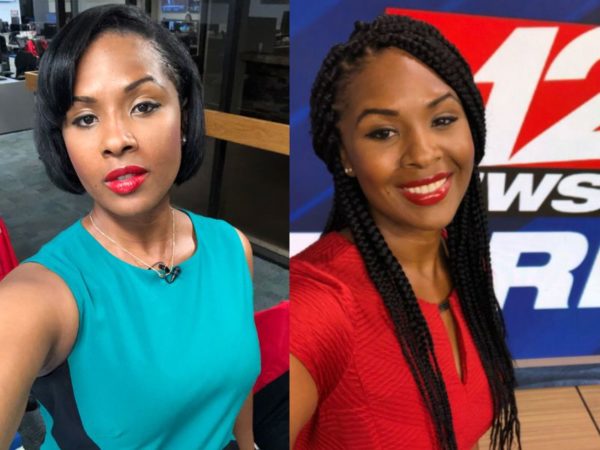After more than a decade as a television news reporter, a West Palm Beach television reporter said she’s feeling more like herself these days now that she is allowed to wear braids for the first time on air. Now she hopes the change will to open the door for more young Black women to do the same in their respective industries.
“Not many people realize that African-American and other women feel and often are forced to wear hairstyles that the company or news station deems acceptable,” CBS12 reporter AJ Walker told Yahoo Lifestyle in an interview. “The freedom to wear my hair in a style that is part of my culture and a skill handed down to me from my mom gives me a stronger sense of self-esteem, self-worth and confidence as a person and as a woman.”

AJ Walker said braiding is a skill she learned from her mother and said the style now serves as as fond reminder of her memory. (Images courtesy of AJ Walker)
“This is a hairstyle I chose for myself. It reflects who I am,” she added.
The Lansing, Michigan, native has worked her way through the ranks at multiple stations across the nation, chasing her dreams of one day becoming an investigative reporter. She now holds that title at CBS12 News and is now fighting broader on-screen representation — starting with her own tresses, according to the news site.
While the “ban” on braided extensions wasn’t explicitly stated, Walker said it was evident that the hairstyle, which she called one of her favorites, was considered unsuitable for the workplace and for on air. The reporter said she was restricted to wearing her hair straight even at previous stations where braids were typically deemed acceptable.
“Your station makes it clear that they are within their rights to have control over how long or short your hair is, hair color, whether or not you can wear extensions, braids, or natural hair,” Walker explained. “Whenever I discussed the possibility of wearing braids on-air with stations, the answer was, ‘Let’s keep your hair the way it is,’ ‘We like your hair the way it is’ and ‘That’s too dramatic of a change.’ ”
She added: “To me, that was still a ‘no,’ although it wasn’t worded that way.”
After taking a break between jobs and mourning the death of her mother, Walker said she found the gumption to ask her employer about switching up her look. She had worn braids in the months before she was hired at the Sinclair-owned news station, but admitted to taking them down for job interview for fear of hurting her changes of being hired.
After her mother’s passing, however, Walker said she wanted to go on-air in the style that had become a fond reminder of their bond.
“I missed my braids,” she told Yahoo Lifestyle. “It is a skill my mother taught me. When she died a few months ago, part of me felt like wearing my hair braided was preserving a part of her.”
Now, the reporter is celebrating alongside her colleagues and viewers, who’ve shown her support for rocking her braided tresses on air. Walker applauded the change as a step in the right direction for Black women in all industries.
Earlier this year, Mississippi anchor Britanny Noble-Jones spoke out against the discrimination she faced at her former TV station where she was allegedly banned from wearing her natural hair and pressured to look like a “beauty queen.”
“A long straight weave can help land you a job because you have ‘the look,’ but that isn’t really our look,” Walker said. “Let us be ourselves. We’re still professionals even if our hair is different.”